Related Research Articles

Richelieu; Or the Conspiracy is an 1839 historical play by the British writer Edward Bulwer-Lytton. It portrays the life of the Seventeenth Century French statesman Cardinal Richelieu. It premiered at the Theatre Royal, Covent Garden on 7 March 1839. The original cast featured William Macready as Richelieu, Edward William Elton as Louis XIII, James Prescott Warde as Baradas, Frederick Vining as Sieur De Beringhen, Samuel Phelps as Joseph, George John Bennett as Huguet, Henry Howe as Francois and Helena Faucit as Julie De Mortemar.
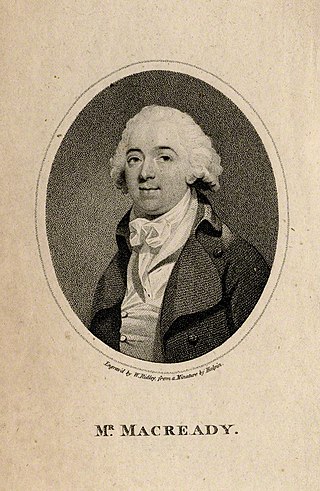
William Macready the Elder (1755–1829) was an Irish actor-manager.

The Road to Ruin is a 1792 comedy play by the British writer Thomas Holcroft.

Fortune's Fool is a 1796 comedy play by the English writer Frederic Reynolds. It was first staged at the Covent Garden Theatre in London.
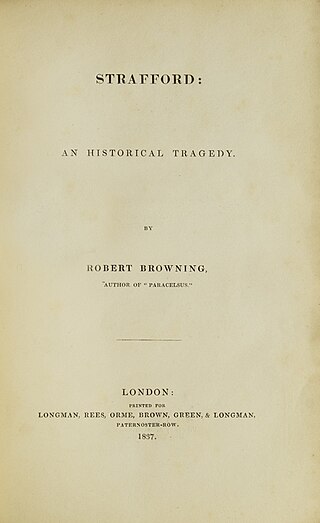
Strafford is an 1837 tragedy by the British writer Robert Browning. It portrays the downfall and execution of Lord Strafford, the advisor to Charles I shortly before the English Civil War.
The Secretary is a play by the Irish writer James Sheridan Knowles. It premiered at the Theatre Royal, Drury Lane on 24 April 1843. The cast included John Ryder as the King, George John Bennett as Duke of Gaveston, Samuel Phelps as Lord Byerdale, William Macready as Colonel Green, Charles Selby as Armstrong, Helena Faucit as Lady Laura Gaveston and Leonora Wigan as Emmeline.
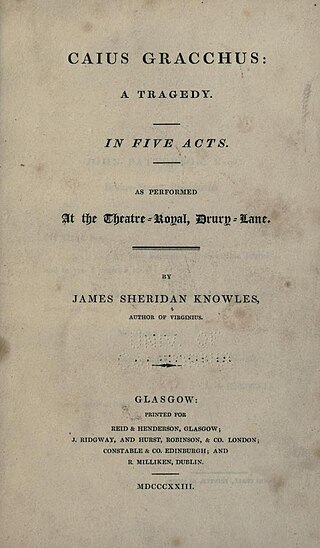
Caius Gracchus is a tragedy by the Irish playwright James Sheridan Knowles. It is based on the life of Gaius Gracchus, a politician in Ancient Rome. The play premiered at the Belfast Theatre in 1815 and enjoyed a good reception. It debuted in London's West End at the Theatre Royal, Drury Lane on 18 November 1823, following the success of the author's Virginius. The London cast included William Macready as Caius Gracchus, William Penley as Licinius, Alexander Pope as Drusus, Daniel Terry as Titus, Charles Mayne Young as Vettius, George Yarnold as Fulvius Flaccus, Thomas Archer as Opimius, Mrs. West as Licinia and Margaret Bunn as Cornelia.

The Bridal is an 1837 tragedy by the Irish writer James Sheridan Knowles. It premiered at the Theatre Royal, Haymarket in London's West End on 26 June 1837 with a cast that included William Macready as Melantius, Edward William Elton as Amintor, Charles Selby as Calianaz and Mary Huddart as Evadne. It is inspired by the Jacobean play The Maid's Tragedy by Francis Beaumont and John Fletcher. In 1843 it appeared at the Park Theatre in New York with Macready repising his role.
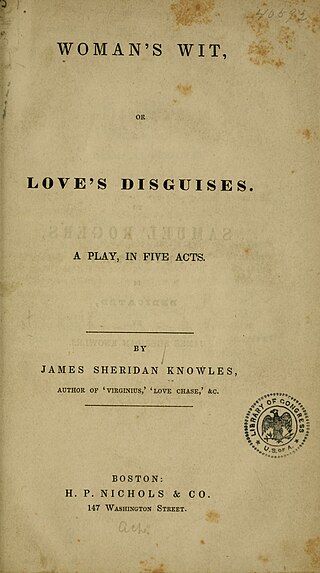
Woman's Wit; or, Loves Disguises is an 1838 comedy play by the Irish writer James Sheridan Knowles. It premiered at the Theatre Royal, Covent Garden on the 23 June 1838 with a cast that included James Warde as Lord Athunree, George Bartley as Sir William Sutton, William Macready as Walsingham, John Langford Pritchard as Felton, John Pritt Harley as Clever and Helena Faucit as Hero. Knowles dedicated the play to the writer Samuel Rogers.
Retribution is an 1818 British tragedy by the writer John Dillon. It premiered at the Theatre Royal, Covent Garden in London on 1 January 1818. The original London cast included Charles Mayne Young as Veranes, King of Persia, William Macready as Chosroo, Charles Kemble as Hamed, Daniel Egerton as Abdas, William Abbot as Hafiz, Daniel Terry as Suthes, Charles Connor as Sohrab and Elizabeth O'Neill as Zimra.
The Provost of Bruges is a historical tragedy by the British writer George William Lovell. It premiered at the Theatre Royal, Covent Garden in London on 10 February 1836. The original cast featured William Macready as Bertulphe, Provost of Bruges, James Prescott Warde as Tancmar, Charles James Mathews as Gautier, Drinkwater Meadows as Phillipe, William Payne as Denis, Robert William Honner as Page, Ellen Kean as Constance and Mary Gossop Vining as Ursula.
The Pledge; Or, Castilian Honour is an 1831 tragedy by the British writer James Kenney. It premiered at the Theatre Royal, Drury Lane in London on 8 April 1831. It is inspired by the play Hernani by French writer Victor Hugo. The original London cast included William Macready as Don Leo, Henry John Wallack as Hernani, John Cooper as Don Carlos and George Yarnold as Don Ricardo.
A Word to the Ladies or A Word for the Ladies is an 1818 comedy play by the British writer James Kenney. It premiered at the Theatre Royal, Covent Garden on 17 December 1818. The original cast included William Macready as Winterland, Charles Mayne Young as Larum, Charles Kemble as Dorrington, Elizabeth Yates as Miss Singleton, Harriet Faucit as Clara Winterland, Charles Connor as Adamant, William Abbot as Young Bowerscourt, William Farren as Old Bowerscourt, John Liston as Silvertongue and John Emery as Snugg.

The Conquest of Taranto is an 1817 musical drama written by William Dimond with music composed by Michael Kelly. It appeared at the Theatre Royal, Covent Garden on 15 April 1817. The original cast featured Junius Brutus Booth as Rinaldo, William Macready as Valencia, Charles Mayne Young as Aben Hamet, Daniel Egerton as Gonzales, Sarah Booth as Oriana and Kitty Stephens as Rosalind. Macready was reportedly dissatisfied with his role, coveting that of Rinaldo, and unsuccessfully offered thirty pounds the Covent Garden manager Thomas Harris to release him during rehearsals. The first Dublin performance was at the Crow Street Theatre on 5 August 1817. It also appeared at the Federal Street Theatre in Boston and other American venues.
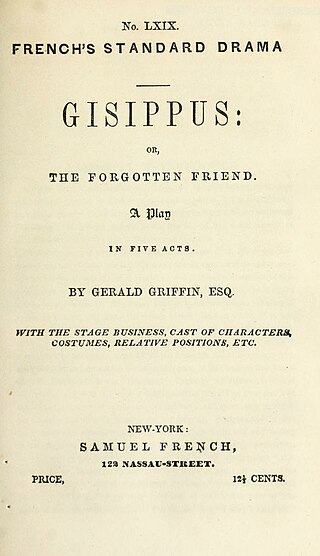
Gisippus is an 1842 tragedy by the Irish writer Gerald Griffin. It premiered at the Theatre Royal, Drury Lane in London on 23 February 1842. It was staged posthumously as Griffin had died from typhus in 1840, and was likely written before 1838. The original cast included William Macready as Gisippus, James Robertson Anderson as Titus Quintus Fulvius, Edward Elton as Pheax, George Bennett as Lycias, Charles Selby as Macro and Helena Faucit as Sophronia. Its opening resembles William Shakespeare's Julius Caesar, but with the setting switched from Rome to Athens. The play was a popular success. It went on to appear in New York at the Park Theatre in 1847 and Broadway Theatre in 1848.

Julian is an 1823 historical tragedy by the British writer Mary Russell Mitford. It premiered at the Theatre Royal, Covent Garden on 15 March 1823. The original cast included William Macready as Julian, Maria Foote as Alphonso, King of Sicily, George John Bennett as Duke of Melfi, William Abbot as Count D'Alba, Daniel Egerton as Leanti, Thomas Comer as Bertone and Maria Lacy as Annabel. Mitford wrote the play during the delays over the staging of her previous work Foscari which finally premiered in 1826. It is influenced by the 1820 rebellion on Sicily and its defeat and repression by Bourbon forces.
The House of Colberg is an 1832 tragedy by the British writer Thomas James Serle. It premiered at the Theatre Royal, Drury Lane on 1 October 1832. The original cast included William Macready as Colberg, John Cooper as Prince of Eisbach, Thomas Cooke as the Chaplain, and Robert William Honner as Steinfeldt. The play was dedicated to the writer Thomas Talfourd.

Master Clarke is an 1840 historical play by the British writer Thomas James Serle. It premiered at the Theatre Royal, Haymarket on 26 September 1840. It revolves around the life of Richard Cromwell, deposed Lord Protector of England, during the seventeenth century.The original cast included William Macready as Richard Cromwell, Benjamin Nottingham Webster as Charles II, Samuel Phelps as General Lord Disbrowe, Walter Lacy as Ingoldsby, Henry Howe as Sir Richard Willis, William Henry Oxberry as Smoothly, George John Bennett as Captain Darnel and Helena Faucit as Lady Dorothy Cromwell. The play was not a great success, partly due to the fact that Macready had not properly learned the part which was to be a growing problem for him.

The Duchess de la Vallière is an 1837 historical play by the British writer Edward Bulwer-Lytton. It is based on the life of Louise de La Vallière, a French aristocrat and mistress of Louis XIV in the seventeenth century. It premiered at the Theatre Royal, Covent Garden on 4 January 1837. The original cast included Helena Faucit as Louise de la Vallière, William Macready as the Marquis Alphonso de Bragelone, John Vandenhoff as Louis XIV, William Farren as the Duke of Lauzun, John Langford Pritchard as the Count de Grammont, William Harries Tilbury as Bertrand and Sarah West as Madame la Vallière.

The Patrician's Daughter is an 1842 tragedy by the British writer John Westland Marston. It premiered at the Theatre Royal, Drury Lane on 10 December 1842. The original cast included William Macready as Mordaunt, Samuel Phelps as the Earl of Lynterne, Edward William Elton as Heartwell, George John Bennett as Lister, Charles Selby as Lord Chatterly, Morris Barnett as Sir Archer Taunton, John Ryder as Physician, George Yarnold as Solicitor, Mary Warner as Lady Lydia Lynterne and Helena Faucit as Lady Mabel Lynterne.